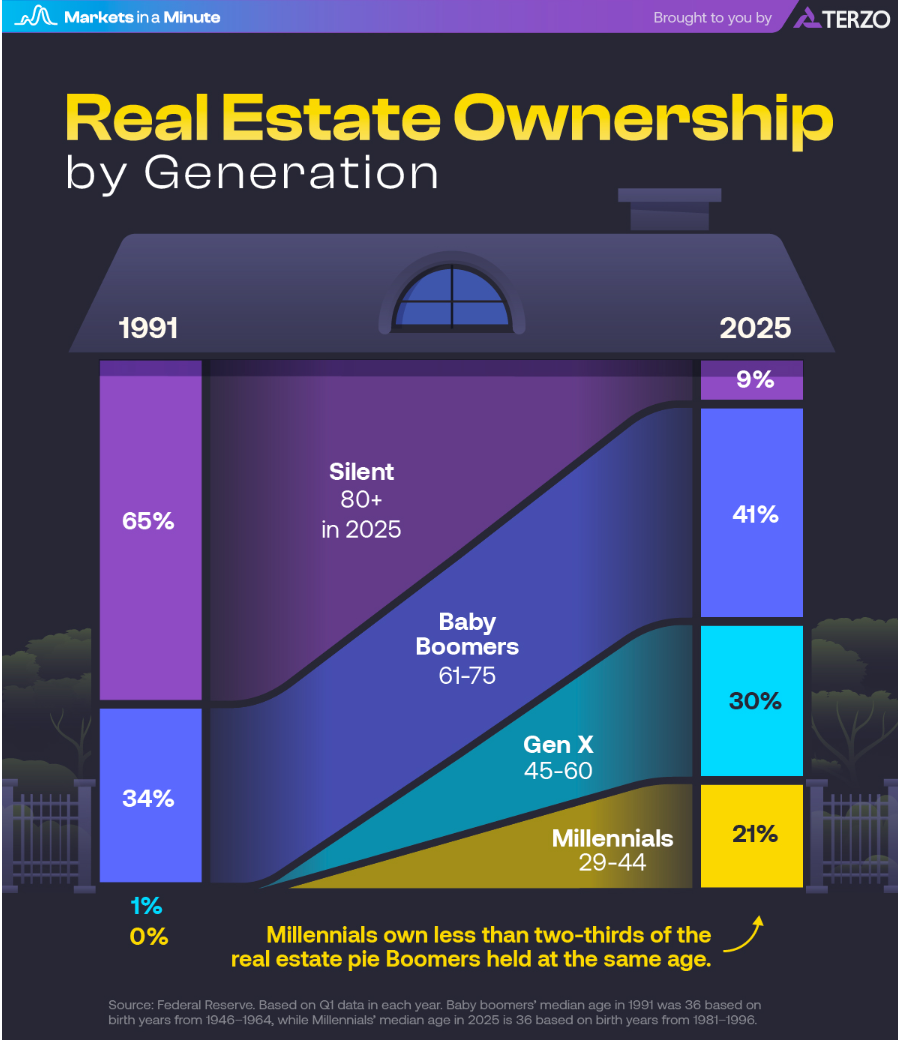Unpacking Real Estate Ownership by Generation (1991 vs. 2025)
By Jenna Ross
Key Takeaways
- In 1991, the Silent Generation held 65% of real estate; by 2025, that has dropped to just 9%.
- Baby Boomers own 41% of property in 2025.
- Millennials own less than two-thirds of the real estate Baby Boomers did at the same age.
Over the past three decades, America’s real estate ownership landscape has shifted dramatically. The distribution of property reflects not just wealth, but also demographic momentum—who’s aging, who’s buying, and who’s being left behind.
Property Power Shifts
Using data from the Federal Reserve, we can see how the breakdown of property ownership has changed over time.
| Generation |
1991 |
2025 |
| Silent |
65% |
9% |
| Baby Boomers |
34% |
41% |
| Gen X |
1% |
30% |
| Millennials |
0% |
21% |
Back in 1991, the Silent Generation owned the lion’s share of real estate. Baby Boomers owned nearly all the rest.
By 2025, this distribution has shifted significantly. The Silent Generation’s share has dropped and Baby Boomers now own the largest percentage. Gen X, now in their peak earning years, has seen their share jump to 30%.
The Factors Driving Real Estate Ownership
The dramatic decline in Silent Generation ownership reflects aging and mortality, and can be one gauge of the wealth transfer.
But the rise of younger generations in real estate has been uneven. Millennials own less than two-thirds of what Baby Boomers did at the same age, highlighting affordability pressures, student debt, and delayed entry into homeownership.
In fact, Millennials’ share of ownership falls far behind their share of the population that is of home-owning age.
| Generation |
Share of Real Estate Ownership in 2025 |
Share of the Home-Owning Aged Population (29+) |
| Silent |
9% |
6% |
| Baby Boomers |
41% |
30% |
| Gen X |
30% |
30% |
| Millennials |
21% |
34% |
Source: Federal Reserve and Census Bureau. Age 29 is used as the cutoff because the youngest Millennials—the latest generation in the data—are 29 in 2025. Numbers may not sum to 100 due to rounding.
On the other hand, Baby Boomers own an outsized proportion of property relative to their share of the population that is 29 and older.
Baby Boomers have benefited from buying at a time when homes were more affordable. And, in one study, a third of Baby Boomers who own their home say they’ll never sell. With the older generation aging in place, it may take time for younger generations to climb the real estate ladder.

